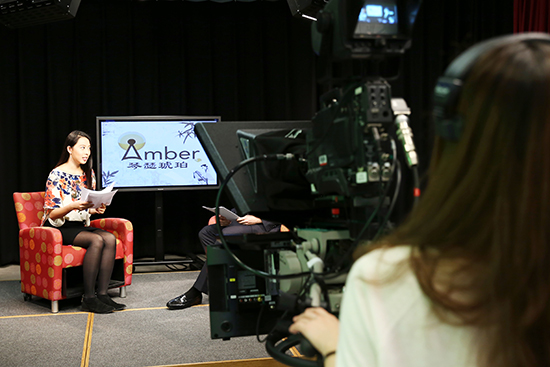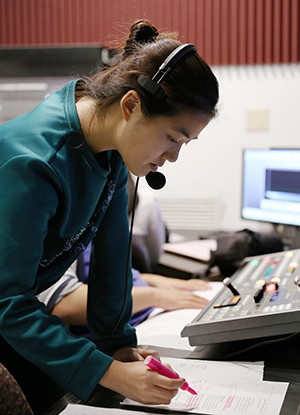First Campus Chinese-English TV Show Aims to Bridge Cultural Divide
BUTV10's Amber “a great way for everyone to learn”

Qinger Lin (CAS’18) (right), frames her camera on news anchor Yuchen Fang (COM’17) at a rehearsal. Photos by Smaranda Tolosano (CAS’17)
It’s a Wednesday night and students are running back and forth between the control room and a BUTV10 studio, frantically dictating directions in Chinese. The anchors take their place on set, the camera crew and floor directors get in position, and in the control room, show director Chenchen Zhao (COM’16) is asking for silence as she begins to count down to the top of the show. Five. Ready on set. Four. Ready prompter. Three. Ready camera two. Two, one. Cue camera two, go. And just like that another episode of Amber, BUTV10’s first—and to date, only—bilingual newscast, is taping.
Amber launched last spring on BU’s student-produced and -managed content distribution network, based at the College of Communication. It is the brainchild of Jennifer Li (COM’15), who came up with the idea for a bilingual Chinese-English show after realizing that many of her American friends were interested in learning more about Chinese culture. “Their interest was one of my major inspirations for the show,” Li says. “The Chinese are proud of our culture, and I wanted to show and present our culture to them.” She also wanted to create a program with stories of particular interest to Chinese students—such as visa issues and the challenges of adapting to American culture.
During its first season, five episodes of Amber, about 12 minutes each, were filmed. This year, each episode is closer to 20 minutes long. Broadcasts are taped on Wednesdays and show the following Tuesday. The lastest episdoe airs tonight at 8 p.m.
“A show like Amber is necessary as there’s an audience to be served, says faculty advisor Chris Cavalieri (COM’81), a COM assistant professor of film and television. “The Chinese student population is a growing presence on campus and their perspective offers many stories to be shared in this cross-cultural exchange. It’s a great way for everyone to learn. I commend the students’ initiative.”

According to the International Students & Scholars Office, 43 percent of all international students—3,637 undergrad and graduate students—are from China.
In less than a year, the show’s staff has grown to 60, with Zhao and Louise Liu (COM’16) now sharing executive producer duties with Li. While many of the students are COM majors, some are from the Questrom School of Business, the College of Arts & Sciences, and other schools. Students choose from a variety of positions: reporter, anchor, editor, or member of the film crew (camera operator, teleprompt operator, set and lighting setup). Some handle the show’s public relations. The assignments are flexible and can vary from episode to episode. And not all of them are from China: during a recent taping, one of the anchors, Ross Hurlock (CGS’16), was being coached in how to pronounce a greeting in Chinese, before reading the rest of his stories in English.
Each episode comprises various segments: a three-to-four minute news block featuring timely stories of particular interest to the BU and Boston international student community, followed by a man-on-the-street segment, where reporters venture across campus to solicit opinions from BU students about different issues. There’s also a discovery segment—in-depth pieces about an interesting person or place in Boston—and a bulletin board segment about important events in the upcoming month.
“I think we’re focusing especially on the culture shock aspects” that Chinese international students face, says Liu. “Every story we pick has something that reflects the differences of the two cultures. If Americans are watching our show, I think one thing that they can take away is how international students are thinking about a particular issue. It’s definitely going to be different.” Past episodes have covered topics such as the H-1B visa, the 2016 US presidential election and what it might mean for the country’s immigration policy, gun control, and a story about Tu Yo Yo, this year’s recipient of the Nobel Prize in Physiology or Medicine.
“Our goal is to create a platform for cultural exchange through the various segments and allow students to develop a better understanding of the United States,” Liu says, “and to provide opportunities for them to practice their media skills.”
Li chose the show’s title, in Chinese Qin Se Hu Po (pronounced Cin se hoo po), because amber is a precious gem in China and a symbol of high quality. She explains that amber is closely tied to butterflies, and that the butterfly symbolizes international students’ journey from China to the United States.
“I hope Amber will allow for conversation between student groups and lead to more understanding culturally about each other’s lives,” Li says.
The latest episode of Amber airs tonight, Tuesday November 17, at 8 p.m. on the BUTV10 website. Those interested in joining the staff or learning more about the show can email amber@butv10.com.
Jennifer Bates can be reached at jennb7@bu.edu.
Comments & Discussion
Boston University moderates comments to facilitate an informed, substantive, civil conversation. Abusive, profane, self-promotional, misleading, incoherent or off-topic comments will be rejected. Moderators are staffed during regular business hours (EST) and can only accept comments written in English. Statistics or facts must include a citation or a link to the citation.